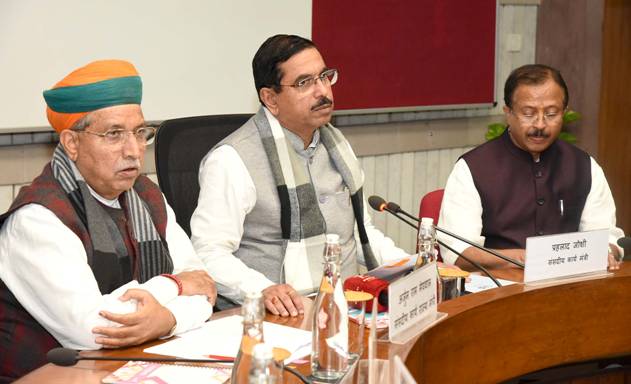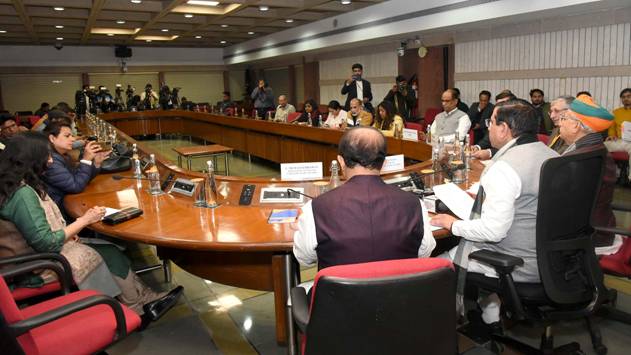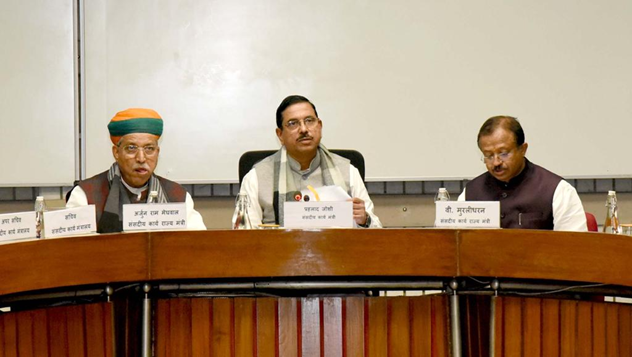Ministry of Parliamentary Affairs
Interim Budget Session of Parliament adjourns sine die
Session provided 9 sittings spread over a period of 11 days
A Total of 12 Bills passed by both the Houses of Parliament
Productivity of Lok Sabha was approximately 148% and that of Rajya Sabha 137% approximately
Posted On:
10 FEB 2024 9:25PM by PIB Delhi
Interim Budget Session, 2024 of Parliament, which commencedonWednesday,the 31st January,2024 hasbeenadjournedsinedietoday,the 10th of February, 2024. Union Minister of Parliamentary Affairs, Coal and Mines Shri Pralhad Joshi held a press conference today after the Interim Budget Session, 2024 of Parliament. Minister of State, Ministry of Parliamentary Affairs and Culture, Minister of State (I/C) for Law and Justice, Shri Arjun Ram Meghwal and Minister of State, Ministry of Parliamentary Affairs and External Affairs, Shri V. Muraleedharan were also present at the occasion. Minister ShriPralhadJoshi informed that the Session provided 9 sittings spread over a period of 11 days. The session was extended by a day so as to transact essential government business.During this Session a total of 10 Bills (7 in Lok Sabha and 3 in Rajya Sabha) were introduced. 12 Bills were passed by Lok Sabha and 12 Bills were passed/returned by Rajya Sabha. Total number of Bills passed/returned by both Houses of Parliament is also 12, stated the minister. A list of Bills introduced in Lok Sabha, Bills passed by Lok Sabha, Bills passed/returned by Rajya Sabha, Bills passed/returned by both Houses is attached in Annex.

Addressing media, the minister informed that productivity of Lok Sabha was approximately 148% and that of Rajya Sabha 137% approximately.
This being the first Session of the year, the President addressed both Houses of Parliamentassembled together in terms of Article 87(1) of the Constitution, on 31st January, 2024. Motionof Thanks on the President’s Address in Lok Sabha was moved by Dr. Heena Vijaykumar Gavit and seconded by Prof. S.P. Singh Baghel. This item engaged the Lok Sabha for 15 Hrs 28minutes against allotted 12 Hours. In RajyaSabhait wasmoved byMs. Kavita Patidar and secondedbyShri Vivek Thakurand the item engaged the House for 15 hours 7 mins against allotted 14 hours. The Motions of Thanks were discussed and adopted after reply from the Hon’ble Prime Minister by the two Houses. 117 Members in Lok Sabha and 57 Members in Rajya Sabha participated in the discussion on the subject.
The Interim Union Budget for 2024- 25 was presented on Thursday, the 1st of February, 2024. General Discussion on the Interim Union Budget and Interim Budget of Union Territory of Jammu and Kashmir for 2024-25 was held in both the Houses. Demands for Grants on Account for 2024-25, Supplementary Demands for Grants - Second Batch for 2023-24, Demands for Grants on Account of Union Territory of Jammu and Kashmir for 2024-25, Supplementary Demands for Grants of Union Territory of Jammu and Kashmir for the financial year 2023-24 were voted in full and the related Appropriation Bills were introduced, considered and passed by Lok Sabha on 7th February, 2024.The Finance Bill, 2024 was passed by Lok Sabha on the same day. This business engaged the Lok Sabha for 10 Hours 18 minutes in which 88 Members participated.

In Rajya Sabha, General Discussion on the Interim Union Budget and Interim Budget for Union Territory of Jammu and Kashmir was held on7th February, 2024. The Rajya Sabha returned the Appropriation Bills related to Demands for Grants on Account for 2024-25, Supplementary Demands for Grants - Second Batch for 2023-24, Demands for Grants on Account of Union Territory of Jammu and Kashmir for 2024-25, Supplementary Demands for Grants of Union Territory of Jammu and Kashmir for the financial year 2023-24 on 8th February, 2024 to Lok Sabha without any recommendations. The Finance Bill, 2024 was also returned by Rajya Sabha on the same day. This business engaged the Rajya Sabha for 6 Hours 40 minute in which 31 Members participated.
In Lok Sabha on 9th February, 2024,a discussion was held under Rule 342 on a motion given by Smt. Nirmala Sitharaman, Minister of Finance on “White Paper on the Indian Economy and its impact on lives of the people of India”. The discussion engaged the Lok Sabha for 7hours25 minutes. In Rajya Sabha the discussion on the subject was held under Rule 176 engaging the House for 3 Hrs 50 minutes.

Minister also elaborated upon thesalient features of work done during the term of 17th LokSabha.
LokSabha had 274 sittings in which 202 Bills were introduced and 222 bills were passed. RajyaSabha had 271 sittings,in which 31 Bills were introduced and 220 bills were passed. In total 221 Bills were passed by both the Houses and became Acts.
First Session of 17th Lok Sabha was historic in many ways as legislations relating to almost all walks of socio and economic activities were passed. 30 Bills were passed by both the Houses of Parliament in that Session which is a record in single first/effective Session after constitution of new Lok Sabha so far.
During the 17th Lok Sabha one of the most important business transacted was the abrogation of certain provisions from Article 370 and Presidential Orders thereunder for ensuring equal opportunities to all sections of Society in Jammu & Kashmir particularly with the restoration of applicability of the provisions of the Constitution of India and all socio-economic legislations thereby ensuring rule of law and equity. Further for ensuring better administration and for curbing terrorism, the State of Jammu & Kashmir was reorganized with the formation of two Union Territories - Jammu &Kashmir and Ladakh.
To meet Constitutional requirements of article 85 and for transacting essential legislative and other Business, the Monsoon Session, 2020 and the first part of Budget Session, 2021 and Budget Session, 2022 were held during the COVID-19 pandemic by making extraordinary arrangements including that of seating and logistics following all guidelines of Ministry of Health and Family Welfare and Ministry of Home Affairs.
The criminal Justice System rooted in the era of slavery is now history. Now, justice takes precedence over punishment. The nation has got a new Nyaya Sanita based on the principle of 'Justice First'. For the purpose, three landmark Bills relating to the criminal justice system to ensure victim-centric justice namely the Bharatiya Nyaya Sanhita, 2023, the BharatiyaNagarik Suraksha Sanhita, 2023 and the BharatiyaSakshya Bill, 2023 replacing the Indian Penal Code, 1860, the Code of Criminal Procedure, 1973 and the Indian Evidence Act, 1872 were passed by both the Houses of Parliament.
A special function was held in the Central Hall of Parliament on 26th November 2019 for Members of both Houses of Parliament to commemorate the 70 years of adoption of the Constitution. The President of India in the august presence of The Vice President, The Prime Minister, The Speaker and The Minister of Parliamentary Affairs and members of both the Houses of Parliament graced the function.
The month of September, 2023 marked a historical occasion when the New Parliament Building was dedicated to the Nation. A Special Session of Parliament was convened which commenced on 18th of September, 2023 in the Old Parliament Building wherein discussion on ‘Parliamentary Journey of 75 Years Starting from Samvidhan Sabha – Achievements, Experiences, Memories and Learnings’ was held in both the Houses. The Prime Minister and other dignitaries addressed Members of Parliament assembled in the Central Hall on 19thSeptember,2023 and thereafter, the respective Houses started their proceedings in the New Parliament Building, rechristened as SANSAD BHAVAN while Old Parliament House including Central Hall has been given the name of‘SamvidhanSadan’.
Special Session of Parliament held during September, 2023 witnessed a historical moment when Nari Shakti VandanAdhiniyam, 2023 i.e. the Constitution (One Hundred and Sixth Amendment) Act, 2023 for giving one-third reservation to women in Lok Sabha and State/Union Territory Legislatures to enable greater participation of women as public representatives in policy making at the National and State levels was passed. The voting pattern in Lok Sabha remained 454 voting in favour and only 2 Members voting against it. In Rajya Sabha, it was passed unanimously.
During this period, following the vision of Prime Minister Shri Narendra Modi under ‘Digital India Programme’, Ministry of Parliamentary Affairs is fast implementing “ National e-Vidhan Application- NeVA” for making all legislatures paperless. Prime Minister made clarion call to all the Presiding officers on 26thNovember, 2020 from Kevadia during 80thPresiding Officers’ Conference for early adoption of NeVA. This call was renewed by the then President of India on 31stJanuary, 2021 during his address to both the Houses of Parliament. So far 22 State Legislatures have signed MoUs while projects of 19 Houses have already been approved and by the time NeVA has gone live in 12 State Legislatures. Concerted efforts are being made for its early implementation in rest of Legislatures including two Houses of Parliament.
The present Government has created a record by scrapping the old, redundant, and archaic Laws from statute books. A total of 1562 old and redundant Laws have been repealed so far since 2014.
****
BY/ST
(Release ID: 2004900)
Visitor Counter : 3141